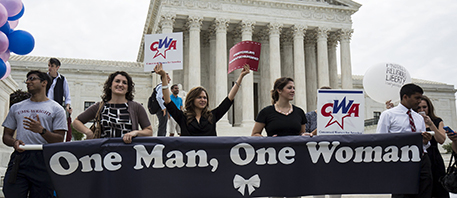USCCB president: Supreme Court ruling on marriage a ‘tragic error’

Photo Caption: Supporters of traditional marriage between a man and a woman rally in front of the U.S. Supreme Court in Washington June 26, shortly before the ruling was announced.
By: By Catholic News Service
WASHINGTON (CNS) — The president of the U.S. bishops’ conference called the Supreme Court’s June 26 marriage ruling “a tragic error” and he urged Catholics to move forward with faith “in the unchanging truth about marriage being between one man and one woman.
“Regardless of what a narrow majority of the Supreme Court may declare at this moment in history, the nature of the human person and marriage remains unchanged and unchangeable,” said Archbishop Joseph E. Kurtz of Louisville, Kentucky.
“It is profoundly immoral and unjust for the government to declare that two people of the same sex can constitute a marriage,” he said.
In a 5-4 decision, the court said states must license same-sex marriage. In the second part of the ruling, the court affirmed that every state must recognize marriages performed in other states, a question that will become moot as the first part of the opinion is enacted.
“Just as Roe v. Wade did not settle the question of abortion over 40 years ago,” when it legalized abortion in the U.S. virtually on demand, Obergefell v. Hodges “does not settle the question of marriage today,” Archbishop Kurtz said.
“Neither decision is rooted in the truth, and as a result, both will eventually fail,” he added.
The court had several marriage cases to consider and bundled them under the title of the Ohio case, Obergefell v. Hodges. That case arose after the October 2013 death of John Arthur of Cincinnati. He and his longtime partner, Obergefell, had married earlier that year in Maryland. When the local Ohio registrar agreed to list Obergefell as the surviving spouse on Arthur’s death certificate — which is key to a range of survivor’s benefits — the state attorney general challenged the status because Ohio law bars same-sex marriages.
The other cases included: Tanco v. Haslam, the Tennessee case, and Bourke v. Beshear, the Kentucky case, which similarly challenge those states’ refusal to recognize same-sex marriages performed in other jurisdictions, and DeBoer v. Snyder, the Michigan adoption case.
“The unique meaning of marriage as the union of one man and one woman is inscribed in our bodies as male and female,” Archbishop Kurtz said in his statement. “The protection of this meaning is a critical dimension of the ‘integral ecology’ that Pope Francis has called us to promote.
“Mandating marriage redefinition across the country is a tragic error that harms the common good and most vulnerable among us, especially children. The law has a duty to support every child’s basic right to be raised, where possible, by his or her married mother and father in a stable home.
—–
DIVIDED SUPREME COURT SAYS SAME-SEX MARRIAGE LEGAL NATIONWIDE
WASHINGTON (CNS) — In a landmark ruling, a divided Supreme Court June 26 said same-sex marriage is constitutional nationwide.
“The nature of marriage is that, through its enduring bond, two persons together can find other freedoms, such as expression, intimacy, and spirituality,” wrote Justice Anthony Kennedy for the 5-4 majority. “This is true for all persons, whatever their sexual orientation.”
In a second part of the ruling, the court affirmed that every state must recognize marriages performed in other states, a question that will become moot as the first part of the opinion is enacted. As of June 26, 36 states, the District of Columbia and Guam allowed same-sex marriage. Some of those states passed laws allowing it, while others have done so under court ruling.
Recognizing in several places the role of religious beliefs in the questions surrounding same-sex marriage, Kennedy said toward the conclusion of his 28-page opinion that “it must be emphasized that religions, and those who adhere to religious doctrines, may continue to advocate with utmost, sincere conviction that, by divine precepts, same-sex marriage should not be condoned.”
The First Amendment ensures protection for religious organizations and individuals as they seek to teach the principles “that are so fulfilling and so central to their lives and faiths,” he continued, and to “their own deep aspirations to continue the family structure they have long revered. The same is true of those who oppose same-sex marriage for other reasons.
“In turn, those who believe allowing same-sex marriage is proper or indeed essential, whether as a matter of religious conviction or secular belief, may engage those who disagree with their view in an open and searching debate. The Constitution, however, does not permit the state to bar same-sex couples from marriage on the same terms as accorded to couples of the opposite sex.”





